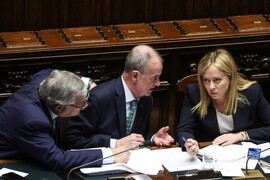The political history of the "new old world", as Perry Anderson defined the European Union has been marked by what academics and columnists have dubbed the "democratic deficit". Until recently, the weakness of democratic legitimacy was rooted in EU institutions, not the European project itself. In terms of its self-representation to its citizens and to the world, Europe has personified widely shared "universal values", and presented itself as a beacon of "the inviolable and inalienable rights of the human person, freedom, democracy, equality and the rule of law", as stated in the Preamble to the Lisbon Treaty. Democratic cosmopolitanism, which is a key chapter in contemporary democratic theory, is a creation of a pro-Europe, utopian approach intended to extend democratic principles beyond national borders, in order to govern economic globalization and protect democracy. In relation to these principles, the "democratic deficit" has been blamed for the incomplete political integration of the Union: while bureaucratic competencies have grown stronger, political bodies have, in terms of accountability, yet to develop beyond the chrysalis stage. Many European people now question the validity and legitimacy of the European Union as a political project.
[...]

Riproduzione riservata




